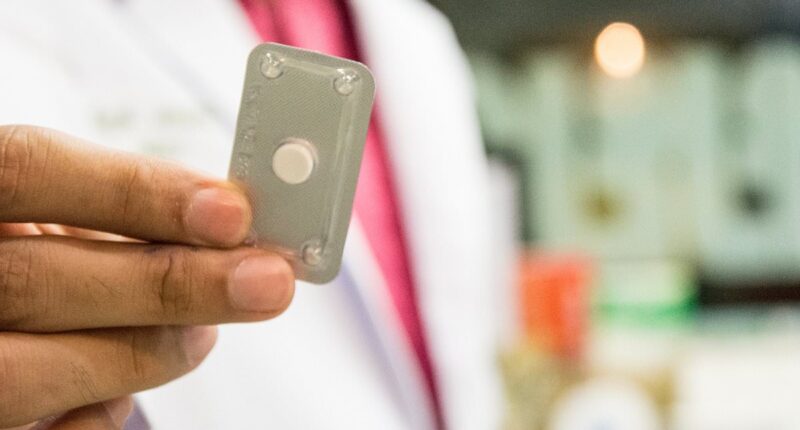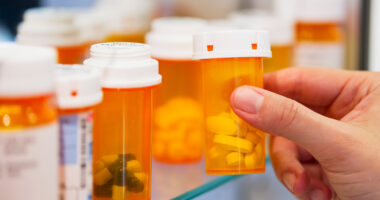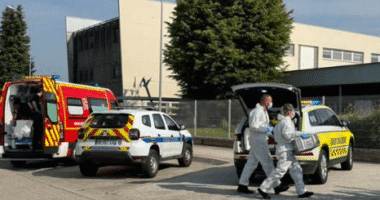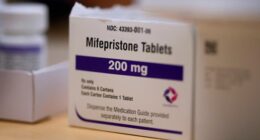The morning-after pill is set to become available for free in pharmacies across England in a bid to end the ‘unfair postcode lottery’ for women, the government has said.
Emergency contraception is currently already free from most GPs and sexual health clinics – but can cost up to £30 from pharmacies, depending on where you go.
Health minister Stephen Kinnock said the proposal, due to come into force later this year, will level out access.
He told the BBC: ‘Women across England face an unfair postcode lottery when seeking emergency contraception, with access varying dramatically depending on where they live.’
Mr Kinnock described equal access to safe contraception as ‘a cornerstone of a fair society’.
He said plan would ensure ‘women can access this essential healthcare when they need it, regardless of where they live or their ability to pay’. It is also hoped the change will also free up GP appointments.
The development is set to be announced tomorrow as part of the government’s broader plans for greater investment in community pharmacies.
But as users took to X to express their thoughts on the move, many were frustrated England had taken 17 years to follow Scotland on this. Emergency contraception has been free from Scottish pharmacies since 2008.

The morning-after pill is set to become available for free in pharmacies across England in a bid to end the ‘unfair postcode lottery’ for women, the government has said. Pictured: File photo

Health minister Stephen Kinnock (pictured) told the BBC: ‘Women across England face an unfair postcode lottery when seeking emergency contraception, with access varying dramatically depending on where they live’
The morning-after pill, or emergency contraceptive pill, can be taken to stop pregnancy after unprotected sex or the failure of other contraception.
It needs to be taken within three to five days of having unprotected sex – but the sooner, the better.
On X, users were frustrated England had taken so long to catch up with Scotland, which made emergency contraception free from pharmacies 17 years ago.
In fact, this policy is already in place in all devolved nations of the UK apart from England.
Wales followed Scotland in 2011, making emergency contraception free from most Welsh pharmacies for those aged 13 or older – whereas in Scotland, it is free without restriction.
In Northern Ireland, emergency contraception is also free from community pharmacies for those aged 13 or older, under the Pharmacy First service – which was introduced in 2005, to redirect treatments from GPs to pharmacists as appropriate.
One X user said: ‘England finally catches up with Scotland where this has been free of charge (as it should be) for years.’
Another chipped in to say: ‘Nice to see England catching up with the best country in the world! Scotland.’





On X, users were frustrated (pictured) that England had taken so long to catch up with Scotland, which made emergency contraception free from pharmacies 17 years ago
Someone else added: ‘Hello from Scotland. Pop into local pharmacy. Been an option in Scotland for ahem years. Why is England[‘s] NHS behind again?’
One person said, exasperated: ‘In England. Behind the times as per usual.’
But another was just glad to see England finally catching up: ‘England falling into line with Scotland. Better late than never.’
The government’s plans for English pharmacies come after calls from sexual health leaders to increase access to the morning-after pill – with some suggesting women should be able to buy it straight off the shelf like condoms.
The Faculty of Sexual and Reproductive Healthcare (FSRH) said last year it was ‘high time’ emergency contraception was made available for general sale in the likes of shops and petrol stations.
The professional body’s president Dr Janet Barter said at the time: ‘Access to contraception is such a basic human right and it is high time we begin to remove the barriers people face accessing oral emergency contraception.
‘We want to make oral emergency contraception free and easily accessible to everyone who needs it, at a time and place that suits them, be that in a supermarket or their local sexual health clinic.
‘It is so important that people can take full control of their own contraceptive needs.’

Dr Janet Barter (pictured), president of the Faculty of Sexual and Reproductive Healthcare (FSRH), said last year: ‘Access to contraception is such a basic human right and it is high time we begin to remove the barriers people face accessing oral emergency contraception’
She added: ‘We believe that the reclassification of oral emergency contraception from a pharmacy medicine to general sales list would be an enormous step forward, giving people autonomy and empowering them to make the right decision for themselves.
‘The next important step in the process to improve access to oral emergency contraception would be to make it free for everyone.’
When contacted for comment, the Department for Health and Social Care pointed to Mr Kinnock’s comments: ‘Equal access to safe and effective contraception is crucial to women’s healthcare and a cornerstone of a fair society.
‘Women across England face an unfair postcode lottery when seeking emergency contraception, with access varying dramatically depending on where they live.
‘By making this available at community pharmacies, we will ensure all women can access this essential healthcare when they need it, regardless of where they live or their ability to pay.
‘We will announce a new package of investment and reform to start rebuilding community pharmacy sector through our Plan for Change.’
NHS England was contacted for comment.

















